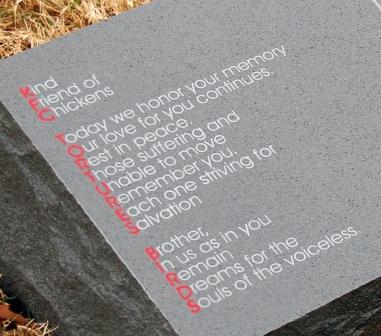Today’s Word of the Day introduces a new section: ‘Anagram’. This section will try to include an anagram of the word of the day.
1 December 2013
acrostic
[uh-kraw-stik, uh-kros-tik]
noun
1. a series of lines or verses in which the first, last, or other particular letters when taken in order spell out a word, phrase, etc.
adjective
2. Also, a·cros·ti·cal. of, like, or forming an acrostic.
Origin:
1580–90; < Greek akrostichís, equivalent to akro- acro- + stích ( os ) stich + -is noun suffix
Related forms
a·cros·ti·cal·ly, adverb
Examples
There are numerous examples of acrostic poetry, including Edgar Allan Poe’s obviously titled poem, An Acrostic, which was written for his cousin and published only after Poe had died:
Elizabeth it is in vain you say
“Love not” — thou sayest it in so sweet a way:
In vain those words from thee or L. E. L.
Zantippe’s talents had enforced so well:
Ah! if that language from thy heart arise,
Breathe it less gently forth — and veil thine eyes.
Endymion, recollect, when Luna tried
To cure his love — was cured of all beside —
His folly — pride — and passion — for he died.
Acrostics have been used as a method of appearing to pay respects to the dead, while actually sending a blunt message. Two of the most famous include the headstone that animal rights organisation PeTA (People for the Ethical Treatment of Animals) placed near the grave of Kentucky Fried Chicken founder, Colonel Harlan Sanders. Refer to the PeTA website for further information (http://www.peta.org/blog/colonel-sanders-graveyard-companion), however, this is a photo of headstone. The acrostic reads ‘KFC tortures birds’:
One other famous acrostic that appears on a headstone, is not exactly safe for work, however, it is worthy of mention given the circumstances. John Laird McCaffery sadly passed away. In an unusual display of bipartisanship, Mr McCaffery’s wife and mistress joined forces and penned a headstone. As Panda’s WOTD is meant to be family and work-friendly, I won’t repeat the acrostic here. However, if you want to see it, please refer to Snopes: http://www.snopes.com/photos/signs/headstone.asp
Anagram
An anagram of acrostic is: socratic (of or pertaining to Greek philosopher Socrates (469-399 B.C.E.), especially in reference to his method of eliciting truth by question and answer. His name is Greek Sokrates, literally ‘having safe might’.)
Today’s aphorism
Beware the barrenness of a busy life.
– Socrates
On this day
1 December 1901 – Britain and Russia in conflict over parts of Afghanistan, establish boundaries which eventually form modern Afghanistan.
1 December 1913 – Ford introduces the continuous moving assembly line which could produce a complete car every 2.5 minutes. This was a revolutionary change to car manufacturing and ultimately impacted on all manufacturing processes.
1 December 1919 – American-born Lady Astor is sworn in as the first female member of the British Parliament. Lady Astor was not the first woman elected to Parliament however. The first was Constance Markiewicz, an Irish woman, who refused to take her seat because of her Irish nationalist views. Lady Astor and Sir Winston Churchill developed a love/hate relationship which resulted in many famous quotes from their repartee. For instance, Lady Astor once said to Churchill, ‘If you were my husband, I’d poison your tea‘. Churchill replied with, ‘If you were my wife, I’d drink it‘. Another famous exchange reportedly occurred when Lady Astor remarked on Churchill’s drunken state, ‘Mr Prime Minister, you are drunk. You are disgustingly drunk‘. Churchill, drunk but still quick with a quip, replied, ‘Lady Astor, you are ugly. You are disgustingly ugly. But tomorrow I shall be sober and you shall still be disgustingly ugly‘. Some reports claim this latter exchange was between Churchill and socialist MP, Bessie Braddock.
1 December 1942 – British Government accepts the Beveridge Report that proposed the establishment of a welfare system to provide care for all people from cradle to grave.
1 December 1943 – conclusion of the ‘Tehran Conference’ during World War 2, in which the leaders of the three major allied powers, Churchill (Britain), Stalin (USSR) and Roosevelt (USA) met in Iran to discuss opening a second allied front against Germany. The conference also addressed Turkey, Iran, Yugoslavia and Japan, as well as post-war settlements between the three nations.

